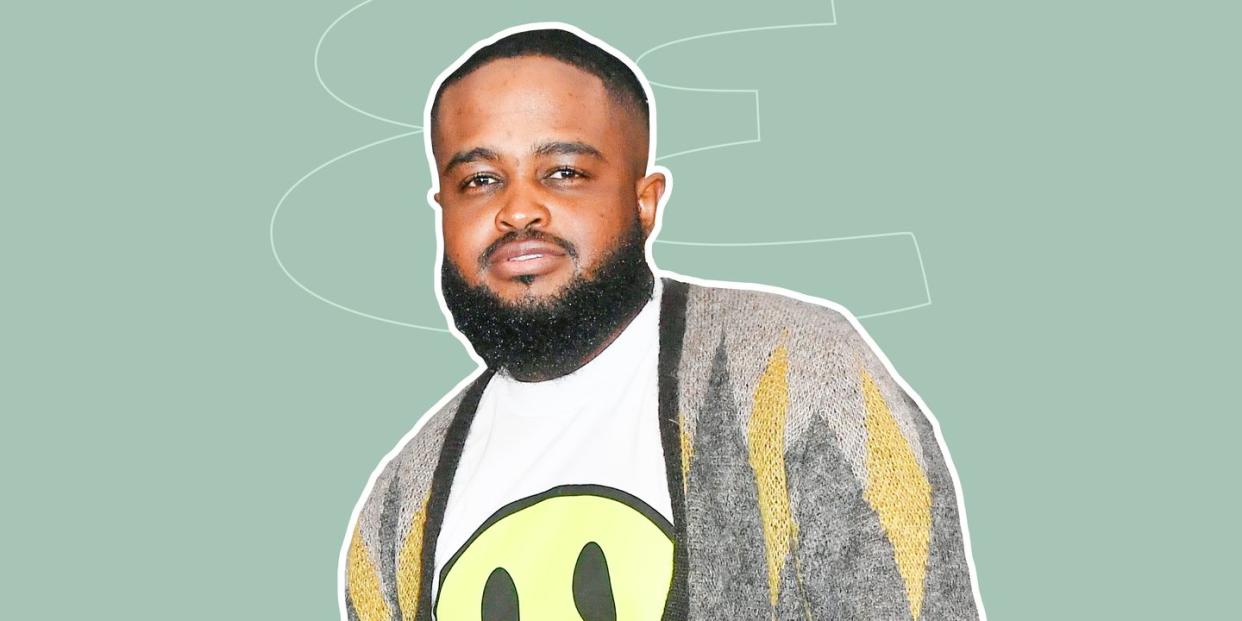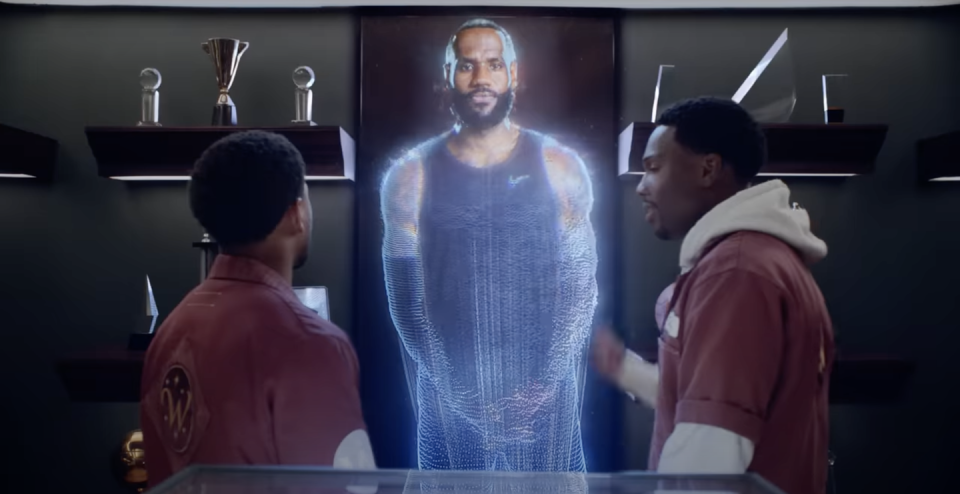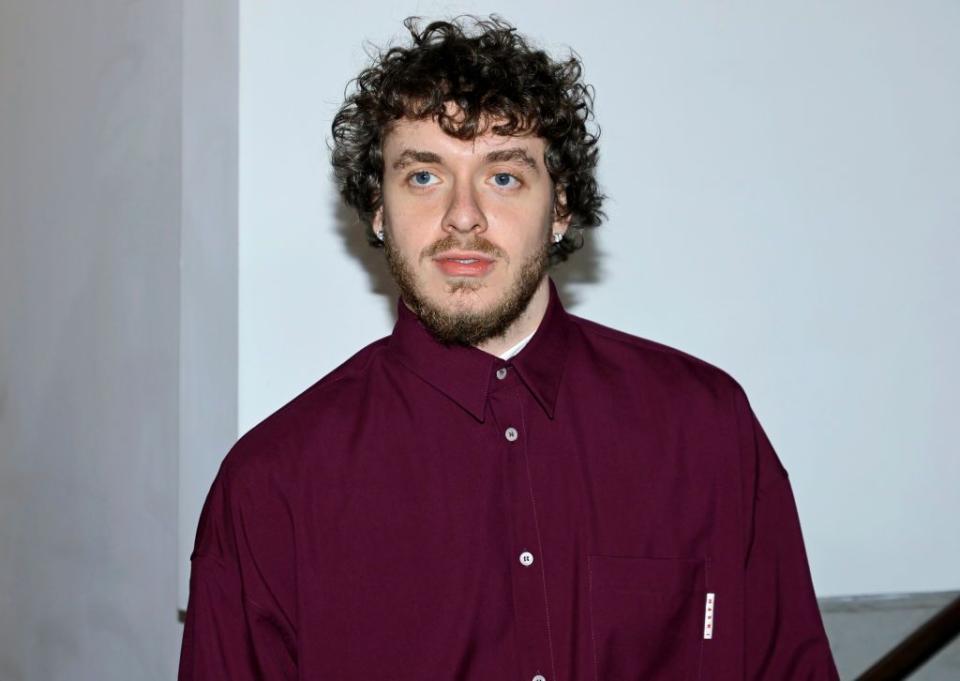Meet the New Director Remixing Your Favorite Movies

Calmatic has made a well-earned pitstop. It’s been almost five years since he was first tapped as the director of a new House Party film—based on the 1990 cult classic, of course—from producer LeBron James. Then, following lengthy COVID-forced delays, Calmatic knocked out his directorial debut, only to start another quasi-remake, White Men Can’t Jump, a few months later. Despite House Party finally debuting in theaters today, and White Men likely coming later this year, the music video director-turned filmmaker isn’t taking a victory lap just yet.
“I'll have a conversation with someone and be like, ‘Yeah, I got House Party and then I got White Men Can't Jump.' And they're like, ‘Man, do you realize what you just said?!’" says Calmati, whose birth name is Charles Kidd II, speaking over Zoom from inside his parked car. "It'll probably hit me once everything is out, but, for now, we are pushing House Party and we want to make this movie a moment in culture. I feel like there hasn't been a film like this in theaters since I don't know when. Back in the day, there’d be Friday, The Wood, all these movies that were culturally relevant for our generation. And kids don't have that these days."
A native of Los Angeles, Calmatic cut his teeth on the music scene alongside friends like Anderson .Paak and Kendrick Lamar, and soon started making a name for himself by directing videos for the likes of Jhené Aiko and Vince Staples. But the game-changer proved to be his Grammy-winning visuals for Lil Nas X and Billy Ray Cyrus’s record-breaking collaboration, “Old Town Road.” And then Hollywood came calling. LeBron James and his SpringHill production company were working on reviving the House Party franchise, and Calmatic was brought in to direct from a script by Atlanta writers Stephen Glover and Jamal Olori. Original House Party stars Kid 'n Play cameo in the new film, but the story follows buddies Kevin (Jacob Latimore) and Damon (Tosin Cole), who, on the verge of being fired from their job as house cleaners, decide to go out with an epic bash at the baller mansion of their latest client: LeBron. What ensues is an unforgettable night that includes a bananas Kid Cudi performance, cameos galore, and a koala to be reckoned with.
Originally slated for an HBO Max premiere, House Party became one of the few projects to benefit from the turnover at Warner Bros. Discovery, with the film being delayed and promoted to a theatrical release. But Calmatic wasn’t sitting around and partying—he was working. Since wrapping House Party, he directed the “Rich Spirit” video for his old buddy Kendrick Lamar, landed a series pickup at Netflix for The Vince Staples Show, and remixed another '90s classic, the Jack Harlow-led White Men Can’t Jump. With today's House Party’s theatrical drop, we jumped into it all with Calmatic.
ESQUIRE: It’s been a long road with House Party, so how are you feeling as you approach the finish line?
CALMATIC: Blessed. It's literally been a five-year journey. I think I first met with New Line at the end of 2018, and then I actually got married, went on a honeymoon, and was like, "Alright, I'm going to dedicate my next two years to this movie." And then COVID happened. So we didn't start filming until 2021, and we were done with the edit by the end of the year, and then the whole Warner thing happened, so it delayed it a bit. I'm super glad to be here, and I'm just ready for it to come out and for the world to see it.
You’re in the unique position where you’re about to drop this film and you already have White Men Can’t Jump filmed and on the way. What’s it been like working to get this one released at the same time that you’re finishing another?
Even though House Party is my first film, I feel like White Men Can't Jump is my first film as well because I did them so close together. House Party, as far as the production goes, I've been telling people that it was scared straight, Hollywood edition. It was like somebody woke me up out of my bed and was like, "You want to make a movie?! Okay, I'm going to give you a beloved title that people are going to judge harshly and I'm going to make you shoot a party movie in the middle of COVID." I had so many obstacles, but I feel like I learned something new every day. I think there might've been a three or four-month gap between movies, so, going into White Men Can't Jump, I had a movie's worth of lessons right away. I can't wait for people to see both movies. I love House Party, but it's one of those things where it's, like, I'm better now. I'm more advanced. You know guys are listening to my old album now—I can't wait until you hear my new one.

I’m sure this is something you’ve thought about over the last couple years, but what are we calling these two films of yours: Remake? Reboot? Remix?
I don't know if I have a term yet; hopefully by the end of this press run I have something. But I come from music. I started off as a producer and rapper, and I made a lot of hip hop beats that were heavily sampled, so I feel like these are just remixes. When [Warner Bros.] first announced that they were remaking House Party, I saw people on Twitter saying that you can't recreate flat tops and the vibe of the '80s, and it's like, "Yeah, you're right, we're not doing that." I've told people that I think House Party is a movie that should be remade or remixed every 10 years. House Party is a snapshot of hip-hop culture at that point in time, and it'll be great if every 10 years each generation could have their own House Party. Like, imagine if they made a House Party in the '70s. We would watch that.
As someone who misses the era of remixes in music, I’m fully onboard with bringing that vibe to film.
Yeah, it's like when you listen to a song that was produced by P. Diddy or something. He's sampling Diana Ross, and, as a nine-year-old, my mom wasn't like, “They're ruining Diana Ross's music!” It is just a new song, a new vibe; a whole new generation gets to experience these sounds that are refreshed for them specifically.
Some of our best directors, like Spike Jonze and David Fincher, got their start in music videos. Is that something you were always keenly aware of in the back of your mind as you contemplated making this transition?
Kind of. I didn't set out with the goal that I want to make movies. I'm always curious about process—and I love the process of making music videos and commercials and films—so I was curious about doing that one day. But it wasn't until this movie was a real opportunity for me that I was like, "You know what, I think I can actually do this."
What films did you grow up on? I was excited when I saw an Instagram post where you had posters up in your office of four of my personal favorites: Hoop Dreams, He Got Game, White Men Can't Jump, and Above the Rim.
That was my inspiration for White Men Can't Jump, just making sure that we had the soul from those movies. But, growing up, you know what's funny, is I'm not really a movie guy. To be honest, there's a lot of movies that I haven't seen, and I don't really want to reveal that list because I feel like I might get banned from Hollywood. [Laughs.] But the movies that I watched I loved. My favorite movie of all-time is Forrest Gump. There was a time in my life where I had three VHS tapes: Forrest Gump, Sister Act 2, and The Nutty Professor. I've seen them at least a thousand times; I know them by heart. I think that's my approach to filmmaking: the drama and light-heartedness of Forrest Gump; Nutty Professor is a blast and one of the coolest movies with the special effects; and Sister Act 2 just struck a nerve on my musical side. So, if you mix those three movies together and add a little bit of one of my other favorite movies, Paid in Full, then that's my style.
So, on either House Party or White Men Can't Jump, did you ever feel a sense of pressure? Like, “Damn, I can’t be the guy that makes a bad White Men Can’t Jump movie!”
There’s definitely pressure. For both of these, I didn't watch the original movies during prep. Every now and then I would reference something in my head, but I wouldn't sit down and watch it because it became a little too nerve-wracking. But. when to the pressures you feel, you think about House Party and you’re like, It was this epic house party that was the best house party ever! And then you look at the script that we have now and it's like, Oh man, is this house party good enough? ... It's hard, because you hope that you do the party justice, but I feel like we nailed it.
The party is set at LeBron’s fictional house, but the real LeBron is a producer on House Party and was heavily involved with bringing it back to the screen. LeBron and his business partner, Maverick Carter, are from the same generation as you, so what’s been like partnering up with them?
It was great. I left a dinner party with them last night, and I was just super grateful for the opportunity to work with them. I remember when I saw the Hollywood Reporter article when LeBron came to L.A. and started SpringHill, and I just had an energy about it. Like, This is going to be something that gives opportunities for people like me to make movies. And the synergy continued once I started working with them, and they've supported me through every step. They've just been great collaborators, and I can't thank them enough for giving me this opportunity. And on a lighter note, just working with LeBron on the acting, he's amazing. I’d give him a note and he’d go execute it to a T, and I was like, Oh, this must be what it feels like to coach LeBron. [Laughs.] He knocked it out of the park.
Were you nervous at all to pitch him some of the jokes that were at his expense?
He had some of those jokes himself. I think the hairline joke was his. We gave him the joke about his rating on NBA 2K being 97, because they ticked him down to a 96 or something like that—which is crazy because 96 is the top ranking. LeBron's a big kid, so to hear him talk about NBA 2K the way we talk about it is super fun.
House Party’s script comes from Atlanta veterans Stephen Glover and Jamal Olori. Watching the scene with Lena Waithe, GaTa, and a koala, I couldn’t help but think of Atlanta. Is it fair to say that Atlanta was as influential as anything when it came to House Party?
Over the last five years, I think I've literally said, "Like Atlanta," a million times. I was talking to someone and they gave me another term for what the style of Atlanta is. Like, observational realism, or something like that, and I remember thinking, OK, that's what I'm going to say instead. Atlanta was one of the first times that we've seen Black culture through the lens of Eurocentric film styles. I feel like when you see a "Black film" it has a certain texture to it. There’s a lot of energy, things are happening, everything’s funny. But we aren't usually allowed to sit back and just be awkward and boring and watch something happen—and that's how real life is. There's no "Black version” of Napoleon Dynamite," but we definitely see life that way.
So I think Atlanta was the first time that we realized that we can do it that way, and it works, and people get it. And so that was the goal for this. I wanted this film to be like if Atlanta had a movie, and how we would expand the world and maybe change a few camera angles here and there and move things a little differently. With their writing style, we had all kinds of crazy shit in the script. And we had to cut things based on budget, but they were just genius. Like, the Odell Beckham Jr. and Lil Wayne moment, that was something that they just thought of and randomly said. And I was like, "Yes, we're putting that in a movie—somebody get Lil Wayne on the phone." That was the funniest shit ever.

Lil Wayne quoting “Go DJ” is probably tied with Kid Cudi’s hysterical performance as my top highlight.
I can't wait for people to see Cudi's performance. When we were doing the trailer, I was like, we cannot give away Cudi's involvement with the film. If we do this thing right, there will be a trending topic on Friday, Jan. 13 that says "Kid Cudi." Because his performance is insane and it’s like imagining him on an episode of Atlanta.
Continuing the theme of mega-rappers starring in your movies, we have to talk about Jack Harlow and White Men Can’t Jump. Were you surprised that he ended up being the guy?
Nah, I've always been a fan of Jack, and we were talking about casting, sitting around and going, “Who do we go out to?” One of the interns just said, “Jack Harlow.” And people weren’t like, "What? No way." It was more like a quiet moment, everyone looking at each other, like, "Oh shit, that actually might work." And he has never acted before, but, man, listen, after this film, I don't think Jack Harlow is going to be a rapper. I mean, I'm sure he is not going to give up rap, but he's definitely going to be a Mark Wahlberg—where I think people are going to know him more for acting than his music. There's no reason why he shouldn't be in two movies a year. He's that great. And so I'm happy that he got his feet wet with White Men Can't Jump so I can take a little responsibility for that. [Laughs.] I'm excited for the world to see him and get the full scope of him as an artist.
You’ve been so deep in the weeds with these two films, but have you been able to put though into what your long-term aspirations are? I’m guessing that you probably don’t want to be remixing classics for the rest of your life.
Yeah, I'm definitely not doing any more remixing anytime soon. These two films gave me the confidence to tell my own stories now, and I can't wait to make something that I don't have a reference for. I also can't wait to make something that Twitter won't kill me for when I announce that I'm directing it. [Laughs.] But I'm super grateful that I was able to start off with these two films that are going to get eyes on them because of their titles. Hopefully, I can create some unique stories that'll get remade 20 years from now.
You Might Also Like